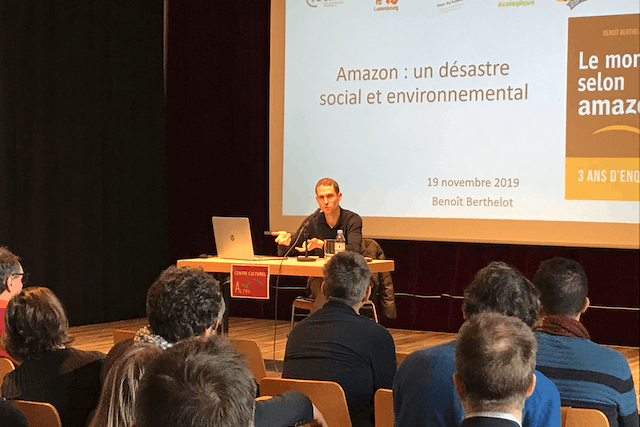Visiting Luxembourg on Tuesday to speak about his book, “Le Monde selon Amazon”, translated as “the world according to Amazon”, Berthelot explained he became interested in Amazon’s activities as a writer for French magazine "Capital".
His three-year investigation helped him examine the management particular practices within Amazon in its search for optimisation. Some practices have led to legal action being taken, such as the case of warehouse workers in Baltimore who were fired via an automatically-generated message for so-called poor productivity, which had been tracked through an application.
More recently, warehouse workers have gone on strike in protest against working conditions, which require them to collect up to 130 articles per hour at the e-commerce giant’s fulfilment centres.
And it is not only in the US. Berthelot’s book features a report from the public health insurance office for the Drôme region which examined why 74% of staff at Amazon's Montélimar warehouse, in France, was suffering chronic work-related pain. “The logistics sector is a difficult one to work in, but Amazon is not within the norms,” Berthelot said.
The journalist’s investigation led him to interview and accompany a sub-contracted delivery driver, whose punishing schedule left little time for toilet breaks. “The one I was with had a jerry can in his car for this purpose,” he said.
Social and environmental impact
The book, which is available to purchase on Amazon.fr, also looks at the social and environmental impact of Amazon’s activities. Berthelot estimated that $2m of unpaid VAT by vendors was missing in France. “Amazon says it’s just a window for other vendors,” the journalist laments. Data handling is another area of concern as Amazon has information on the shopping habits of its users, which can be monetized.
Amazon has audited its carbon footprint, publishing in September the results which found they emitted 44 million metric tonnes of CO2 per year. Berthelot estimates the activities of Amazon’s web "cloud" services alone are the equivalent of emissions from the country of Portugal. The journalist underlined the fact that goods are sometimes imported from the other side of the planet (30% of vendors are believed to be based in China, according to Berthelot), the journeys required to fulfil orders within a matter of hours and the destruction of products to free up warehouse space, bringing the debate back round to how sustainable the online shopping giant can be.
“For the coming years, Amazon will continue to grow, that’s certain,” the journalist said, pointing out the 15% annual growth of the firm.
The firm is investing heavily in automating its operations through the use of robots and drones, a move which is expected to lead to redundancies in Amazon's warehouses in future. Reuters reported that the number of job losses from this first round of automation at its US warehouses would be around 1,300.
But, it's not all bad news for the worker or consumer. Berthelot is hopeful that the European commissioner Margrethe Vestager’s investigations into competition policy, launched in July 2019 will draw benefits for consumers, small vendors and workers, above profits.
Elsewhere, Berthelot said he is seeing a consumer shift more towards locally-sourced goods, which could disrupt Amazon’s global operating model.
Amazon's reponse
An Amazon spokesperson responded to the claims made by Berthelot.
On warehouse conditions, Amazon said that 84% of employees in France were satisfied with with jobs and 7 out of 10 would recommend the firm as employer.
"We are proud of the workplace we provide our employees. Our associates receive industry-leading pay and benefits including private healthcare, they are treated with respect and, most importantly, they work in a safe, modern environment."
On the Montélimar health report findings, Amazon said:
"Safety is a priority in our distribution centres: we work with health professionals on all sites and apply recommendations of the relevant institutions." It claims that 86% of Amazon staff said they feel safe in their job.
On sub-contracting of delivery, Amazon said that the terms of engagement are set by local delivery partners.
On unpaid VAT of third-party vendors, Amazon said:
"These sellers are independent businesses responsible for complying with their own VAT obligations and we support them in doing so by offering comprehensive information, training and tools to assist them. If we receive actionable information that a seller is not VAT compliant, we have processes in place for reviewing the account and taking down the seller."
On the carbon footprint of Amazon's activities, the firm said it has pledged to achieve 100% renewable energy by 2030 and is investing $100m in reforestation projects. It has also ordered 100,000 electric delivery vehicles.
On the use of customer data, Amazon said it does "not use information from publisher websites to inform advertising audience segments."
